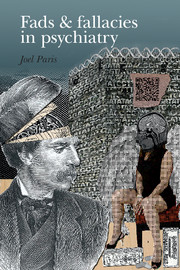7 - Psychopharmacology
from Part II - Effects
Published online by Cambridge University Press: 01 January 2018
Summary
The triumph and tragedy of psychopharmacology
The successful treatment of mental illness with drugs that began in the 1950s was a landmark in the history of medicine, and as an undergraduate student, I had the luck to see it happen. In 1958, I joined a group that spent weekends visiting a nearby 4000-bed mental hospital. The physicians there were just beginning to use antipsychotics. The condition of many patients was desperate. Yet, a few years later, by the time I entered medical school, effective treatment was widely available. Although relapses were still common, patients who had psychoses no longer spent months, or years, languishing in hospitals. There can be no doubt that antipsychotic drugs are among the most effective drugs in all of medicine.
Other breakthroughs followed. Antidepressants (mainly tricyclics) were also introduced in the late 1950s, proved effective for patients with severe depression, and turned ECT from a standard treatment to a back-up. By 1970, lithium was available for the management and prevention of manic episodes. I saw patients with bipolar disorder who had been admitted to hospital 25 times or more recover and return to their lives. This was an inspiring time to study psychiatry.
Like most psychiatrists of my generation, I was deeply impressed with these new drugs, and had no hesitation in prescribing them. Moreover, psychopharmacology was a scientifically based field, with a theory built on research in neuroscience and a practice rooted in systematic clinical trials. Yet several decades later, I find myself a critic of the field, at least as it is currently practised. I am puzzled, and sometimes appalled, by the way drugs are being prescribed, and find myself fighting a tidal wave of overprescription. Although today's drugs are no better than what was available 40 years ago (Healy, 2012), they are given to almost every patient who comes to a physician with psychiatric symptoms.
To understand these problems better, I wrote a book (Paris, 2010a) about what the research literature in psychopharmacology actually shows. I was stunned to discover how large the gap is between what we know and what practitioners actually do.
- Type
- Chapter
- Information
- Fads and Fallacies in Psychiatry , pp. 65 - 78Publisher: Royal College of PsychiatristsPrint publication year: 2013



